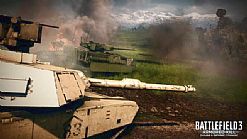Wywiad z autorami Dark Scavenger, interesującego połączenia RPG i gry paragrafowej
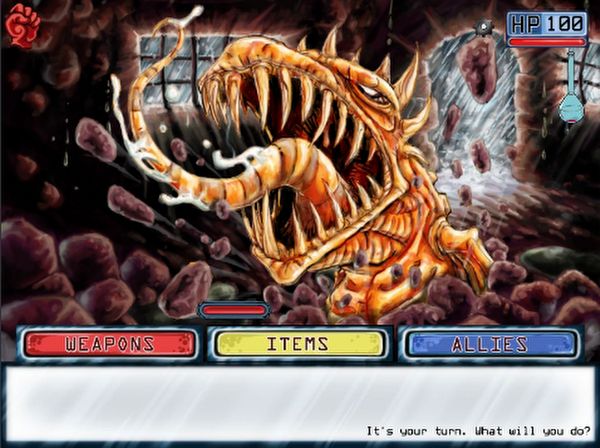
Dark Scavenger to jedna z najciekawszych gier w jakie grałem w tym roku. Świetnie wykonane połączenie visual novel, RPG i gry paragrafowej kupiło moje serce i polecam je Wam jak tylko mogę. Grę recenzowałem jakiś czas temu na serwisie gadżetomania, a teraz zapraszam Was do przeczytania wywiadu z jej autorami.
Wersja polska:
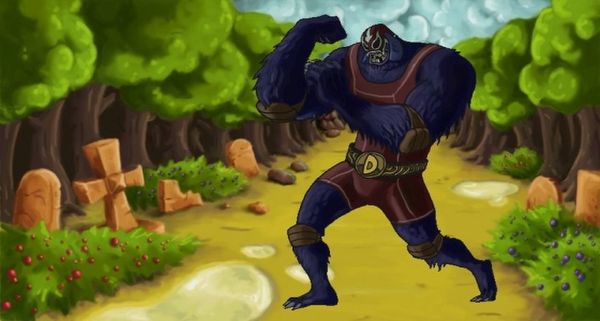
1. Skąd wziął się pomysł na Dark Scavengera? Kiedy na niego wpadliście?
Pomysł pojawił się dawno temu i był zainspirowany stołowym RPG, które wymyśliłem jeszcze w szkole. Ten RPG rozwijał się stopniowo aż stał się tym, czym teraz jest Dark Scavenger. Dark Scavenger jest znacznie uproszczoną wersją oryginalnej gry, ale czerpaliśmy dużo z jej systemu i świata przedstawionego, co pozwoliło nam szybko sprecyzować narrację oraz gameplayowe cele.
Nasz kolega z BizDev Kyle Perry jest jedną z osób, które grały w tego stołowego RPGa, więc pomagał nam przy testowaniu gry i ustalaniu balansu. Całkiem miłe zrządzenie losu.
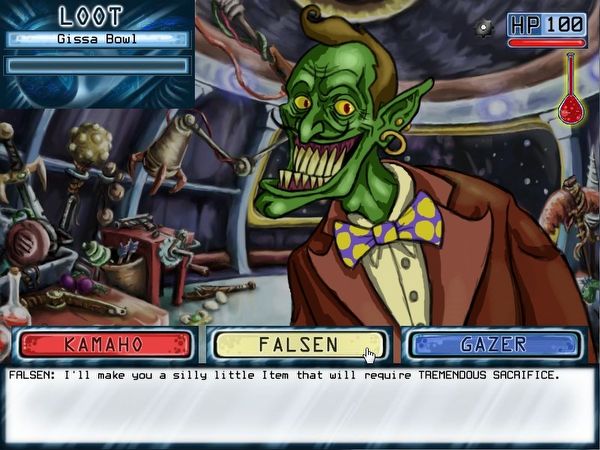
2. Co was inspirowało? Przyznaję szczerze, że w Dark Scavengerze widzę wiele odniesień do seriali telewizyjnych, literatury i innych gier wideo, ale nie wiem, czy nie za bardzo się ich doszukuję.
W grze na pewno występuje wiele humorystycznych odniesień do innych tytułów, ale poza takimi subtelnymi (a czasem trochę mniej subtelnymi) aluzjami, naszym celem było stworzenie tytułu, który sam w sobie stanowi wyjątkowe przeżycie. Gameplay gry był jednak odrobinę inspirowany klasycznymi RPGami, takimi jak Final Fantasy i Earthbound, a wydźwięk gry kojarzy się z Monkey Island i Kingdoms of Loathing.
Poza tym jestem zagorzałym miłośnikiem przestrzeni kosmicznej, ninjów i profesjalnego wrestlingu. Bezpiecznie będzie zakładać, że większość moich zainteresowań jest zakopana gdzieś głęboko w grze.
3. Ile trwała produkcja gry? Ile was to kosztowało?
W różnych okresach nad grą pracowało od czterech do piętnastu osób, a jej produkacja trwała około półtora roku.
Niewiele osób zaangażowanych w projekt było opłacanych z góry. Usiłowaliśmy raczej zgromadzić bliskich przyjaciół i profesjonalistów z rynku gier wideo, którzy chcieli pracować nad czymś wyjątkowym i użyć umiejętności, których normalnie nie mają okazji wykorzystać. Nasz budżet był daleko poniżej normy, ale i tak udało nam się zrealizować z nim dużo wspaniałych pomysłów.
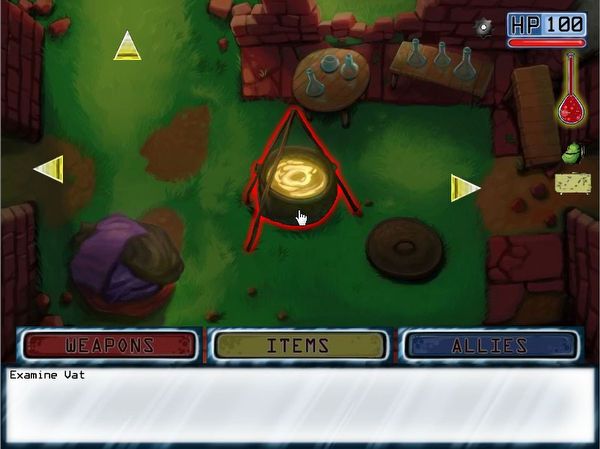
4. Dark Scavenger jest z pewnością tytułem nietypowym. Świetna muzyka, dziwna grafika – dość ryzykowna mieszanka. Dlaczego zdecydowaliście się na obrazki zamiast pikseli? Dlaczego taka muzyka?
Chcieliśmy mieć pewność, że Dark Scavenger będzie czymś, czego jeszcze wcześniej nikt nie widział. Za dużo gier zamyka się w tematach typowych dla gatunku fantasy i sci-fi – naszym celem było rzeczywiście zabrać graczy w podróż do innego świata jednocześnie umożliwiając im łatwy dostęp poprzez wykorzystanie popularnych elementów.
Mimo wywoływania kontrowersji wybór obrazków zamiast animacji okazał się dobrym rozwiązaniem. W związku z ograniczeniami budżetu stwierdziliśmy, że możemy zrobić jedno z dwojga – stworzyć zaledwie kilka ładnych animacji albo tonę świetnych statycznych obrazków. Żeby spełnić nasze wcześniejsze założenia dotyczące design zdecydowaliśmy się na to drugie rozwiązanie, co w rezultacie sprawiło, że w grze pojawia się niesamowicie dużo specyficznych spotkań z wrogami i NPCami.
Co do muzyki, raz jeszcze zainspirowała nas przeszłość gier. W czas 8 i 16 bitów kompozytorzy muzyki do gier mieli znacznie mniej pracy i przez ograniczenia sprzętowe skupiali się bardziej na melodii i zestawianiu dostępnych im dźwięków w celu tworzenia utworów, które bardzo wpadają w ucho. Mimo że nasz styl to nie do końca chip-tune, my również mieliśmy takie podejście. Chcieliśmy być pewni, że muzyka z Dark Scavengera będzie bezlitośnie wpadać wszystkim w ucho i w konsekwencji będzie na długo pozostawać w pamięci.
5. Czym zajmujecie się na co dzień?
Ja jestem w zasadzie “podwójnym developerem”. Każdego dnia przez osiem godzin projektuję gry dla Other Ocean Interactive, a potem, gdy wracam do domu… projektuję jeszcze więcej gier dla Psydra. Może się to wydawać trochę dziwne.
Prawie wszyscy uczestnicy projektu są związani z rynkiem gier wideo. Jim Otermat (programista) jest inżynierem w GSN, a Joe Kelly (kompozytor) jest głównym muzykiem Harmonix.
A Kyle Perry gra w Diablo 3.
6. Planujecie jakiś sequel?
Myśleliśmy o tym, ale musimy poczekać i zobaczyć, jak poradzi sobie Dark Scavenger. Jeżeli będzie taka potrzeba, na pewno będziemy się nad tym poważnie zastanawiać.
Chciałbym teraz jednak zrobić coś bardziej nastawionego na akcję, ale to wszystko, co mogę w tej chwili na ten temat powiedzieć.
7. Uważam, że mało jest obecnie gier o klimacie podobnym do Dark Scavengera, gier z wieloma wyborami. Co do wyborów, w waszej produkcji były to jedne z najciekawszych jakie widziałem od lat, kojarzyły mi się z Tactics Ogre. Dlaczego tyle wyborów pojawia się w grach podobnych do waszej i w visual novels, a w grach AAA jest ich bardzo mało i nie mają większego znaczenia?
Prostsza grafika i gameplay pozwalają nam (i innym twórcom gier w stylu visual novels) wymyślać bardziej szalone scenariusze, które byłyby zbyt wymagające dla grafiki używanej w grach AAA.
Poza tym wiele gier AAA wpada w pułapkę dobra i zła. Takie rozwiązanie w zasadzie działa przeciwko konceptowi gier RPG tworząc jedynie iluzję wyboru, a gracz jest zmuszony do dostosowania się do jednej ścieżki w celu uniknięcia gameplayowych lub fabularnych konsekwencji.
Wiele dużych firm produkująych gry może również bać się ryzyka związanego z oferowaniem wyborów. Gry AAA wymagają dużego budżetu i czasem jakiekolwiek kontrowersje mogą bardzo zaszkodzić grze pod względem sprzedaży. Na przykład w Dark Scavengerze jest ścieżka fabularna, która wymaga przekonania NPCa do samobójstwa przez skoczenie z budynku akurat w momencie, kiedy czai się tam potwór. W komercyjnym tytule taki scenariusz mógłby nie być mile widziany.
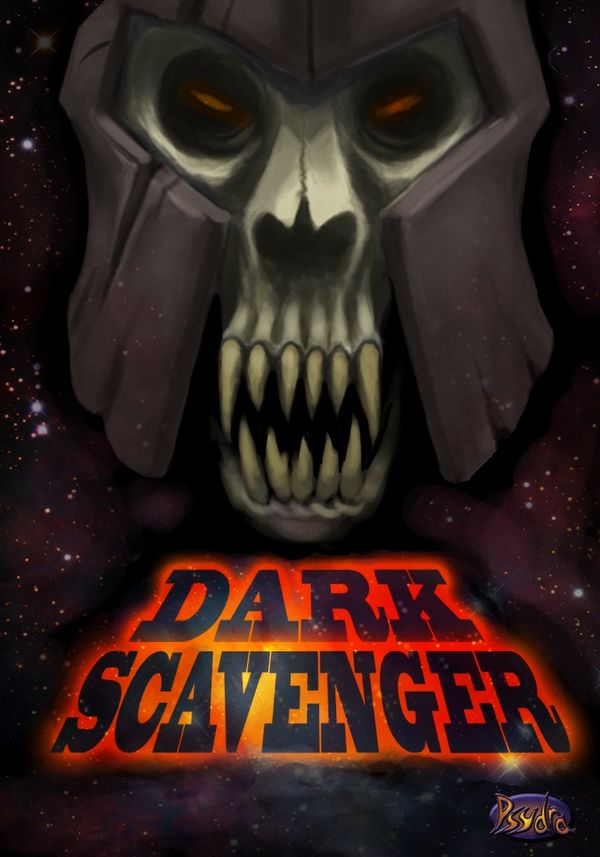
8. Czy macie jakieś rady dla tych, którzy chcieliby w przyszłości pracować w branży? Dla scenarzystów, grafików, programistów?
Najlepsza rada: po prostu zacznijcie robić gry. Znajdźcie innych ludzi o podobnych zainteresowaniach i spróbujcie swoich sił. Firmy chcą zobaczyć waszą pracę i wiedzieć jaki był wasz wkład pracy. Poza tym nic nie wygląda lepiej w resume niż wydana gra.
QA też jest dobrym sposobem żeby gdzieś się wkręcić. Jeśli nie gwarantuje prostej drogi rozwoju, to chociaż pomaga zapoznać się z różnymi aspektami tworzenia gry.
Niezłym pomysłem jest także udział w Game Jams, grupach zajmujących się grami niezależnymi oraz IGDA.
9. Czy Dark Scavenger będzie częścią jakiego niezależnego bundle’a?
Tak, niedługo gra będzie w jednym z bundle, ale nie możemy na razie powiedzieć nic więcej na ten temat. (Czas przeszły, wywiad mi się poślizgnął z publikacją…)
10. Dark Scavenger w ciekawy sposób bawi się gatunkami i atmosferą. Czy znacie jakieś podobne gry?
Z tego co wiem, Dark Scavenger to wyjątkowa bestia chociaż na pewno istnieją gry podobne przynajmniej w niektórych aspektach. Gatunkowe oraz gameplayowe konflikty były jednak bardzo starannie przemyślane i wynikają z fabularnych rozwiązań.
11. Co niektórzy krytykowali was za to, że żądacie zapłaty za flashową grę. Mimo że osobiście uważam waszą grę za jedyną w swoim rodzaju, chciałbym żebyście w paru słowach ją zareklamowali.
Mimo że używamy flasha, Dark Scavenger jest pełnoprawnym tytułem, który oferuje znacznie więcej niż pozycje, które normalnie znaleźlibyście na darmowym portalu z flashowymi grami. Jest też kilka innych świetnych gier, które używają flasha, np. Machinarium lub VVVVVV.
Nie powinno się oceniać gry po silniku, ale raczej po tym, co developerzy zdołali z tego silnika wyciągnąć. Można w ten sposób przegapić naprawdę wiele ciekawych doświadczeń.
English version:
1. When and how the idea came to your mind?
This idea came to surface a long time ago actually from a pen-and-paper RPG I created back in high school. That pen-and-paper RPG evolved over the years until it became the entity known as Dark Scavenger.
While Dark Scavenger is a greatly-simplified version of that game, the various established systems and lore gave us a lot of content to draw from and helped us quickly focus our narrative and gameplay goals.
Our BizDev dude Kyle Perry is actually one of the original players of that RPG and was able to function as both a Playtesting and Gameplay Balancing consultant outside his business role. Kind of a cool twist of fate.
2. What were your inspirations? I admit honestly that I see many referrals to TV series, literature and other video games in the title, but I don’t know if I’m not too scrupulous in looking for them.
There are definitely a lot of humorous references to other titles but outside of subtle (and some not-so-subtle) allusions, our focus was to create an experience entirely of its own accord. Our gameplay does take some cues though from classic RPGs such as Final Fantasy and Earthbound, as well as a tone resemblantof such games as Monkey Island and Kingdoms of Loathing.
Also, I am completely fascinated with space. And ninjas. And professional wrestling. It's safe to assume that most of my interests lie hidden away somewhere deep within Dark Scavenger.
3. How long the development of the game took you? How much did it cost?
The game took about a year and a half to complete with a core team of four people and an extended team of almost fifteen.
Very few people on the project were paid up-front. It was more or less a gathering of industry professionals and close friends who wanted to make something unique and use some skills that they didn't normally get to utilize. Our overall budget was well-below the industry norm but we managed to do some absolutely crazy things with what we had.
4. The setting of the game is quite untypical, I believe. Great music, weird graphics – quite a deadly mixture. Why did you choose pictures instead of pixels? Why such sound?
We wanted to make sure Dark Scavenger was set in a place that no one has ever seen before. Too many games fall back on established fantasy and sci-fi tropes - it was our goal to ensure that we were truly transporting the players to another world while keeping it accessible by mixing in some familiar themes.
Despite a bit of controversy, choosing still-pictures over animated-sprites turned out to be a solid choice. Due to budgetary constraints, we found ourselves able to deliver either a few nice looking animated sprites or a ton of great looking static images. To ensure that our Design goals were met we chose the latter and as a result, it has allowed us to have a staggering amount of unique enemy and NPC encounters.
For the soundtrack, we once again looked to the past. Back in the 8-bit and 16-bit days, game composers had far less to work with and through those constraints, they were forced to rely more on driving melody and clever arrangements of the existing sounds in order to produce the songs that would never leave your head.
Although our musical style isn't exactly chip-tune, we have adapted that same mentality in the construction of our game to ensure that all the music in Dark Scavenger is ruthlessly catchy and ultimately, memorable.
5. What do you do in your everyday life?
I am actually a double-developer. For eight hours each weekday, I design video games for Other Ocean Interactive and then when I get home... I design more video games for Psydra. Kind of weird how that works.
Almost everyone on the project in fact is in the game industry. Jim Otermat (our Coder) is an Engineer at GSN and Joe Kelly (our Composer) is an Audio Lead at Harmonix.
And Kyle Perry plays Diablo 3.
6. Are there any plans of the sequel?
There is definitely some talk about that stirring around but we'll have to wait and see how this game does. If there is demand for it, it is something we may consider.
However, I am considering more of an action-oriented affair for my next venture but that's all I can say regarding that for now...
7. I believe there is too few games with the atmosphere matching this of Dark Scavenger, with choices. The choices in your game were of the most interesting I’ve seen in years, like in Tactics Ogre. Why in your opinion there is multitude of choices in games like yours and in visual novels and in AAA games they are scarce and of no meaning?
Using simpler graphics and gameplay allows us (and other visual novel style games) to get away with crafting some crazier scenarios that could potentially be too taxing for a game with AAA visuals to effectively portray.
Additionally, a lot of AAA games seem to be trapped in the mind-set of a good/evil system. This actually works against the concept of role-playing, providing only the illusion of choice as players are forced to conform unto a single path a for the sake of avoiding gameplay or narrative consequences.
Finally, it is possible that some of the larger companies may just be afraid to take chances. There is a lot of money on the line with a AAA project and controversy can (sometimes) be counter-productive in terms of sales. Within Dark Scavenger for example, there is a scenario that involves stalling and then finally convincing an NPC to commit suicide by jumping off a building at the EXACT moment that a hostile monster is crawling below him... that might be frowned upon in a commercial title.
8. Do you have any pieces of advice for those who would like to work in video games industry? For writers, graphic artists, programmers?
My best advice would be to just start making games. Find some good buddies who share similar interests and then go for it. Companies want to see actual work and what your contribution was to it. Also, nothing looks better on your resume then a shipped game.
QA is also a good way to get your foot in the door. While not a guaranteed route to development, it will help familiarize you with all the various facets and departments involved in the creation of a game.
Getting yourself involved in the various Game Jams, indie game development groups and the IGDA is never a bad idea either.
9. Is your game going to be a part of any independent games bundle?
We are in fact going to be part of a bundle in the near future. We can't disclose any information at the moment but there will be more news soon!
10. Dark Scavenger plays with genres and atmosphere in an interesting way. Do you know any similar games or do you think Dark Scavenger is the only one of the kind?
As far as we know, Dark Scavenger is a unique beast, though there are certainly games out there with similar aspects. The various gameplay and genre clashes however are very much deliberate and a result of what we were trying to accomplish with the story.
11. Several people criticized you explaining you demand money for a flash game. Even though I think your game exceptional, how would you convince payers to buy Dark Scavenger?
Although we are using Flash as an engine, this is a fully-featured game with much more content and depth than the games you would typically find on a free Flash portal. There are several great games out there that use Flash such as Machinarium and VVVVVV.
People shouldn't judge a game by its engine but rather what the developers have been able to accomplish with it. Otherwise, they might end up missing out on a lot of great game experiences.
